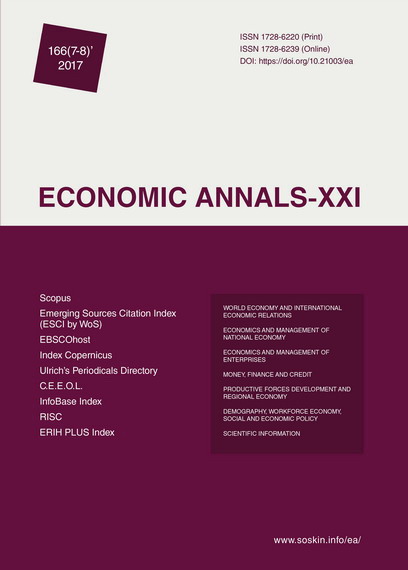Studying transactions of economic agents in the situation of insolvency (neo-institutional approach): the cases of France and Russia
Studying transactions of economic agents in the situation of insolvency (neo-institutional approach): the cases of France and Russia
Author(s): Marina Parkhomchuk, Natalya Tsukanova, Artem GolovinSubject(s): Economy
Published by: Institute of Society Transformation
Keywords: Opportunistic Behaviour; Neo-institutionalism; Bankruptcy; Insolvency; Penalties; France; Russia;
Summary/Abstract: Introduction. A large number of different forms of transactions between agents are used by economic actors when performing economic and other activities. The foundations of neo-institutional theory are based on studying economic rather than legal aspects of various contracts, content and characteristics of mutual economic ties of actors in various types of contractual relationships, as well as the role and level of influence of specific contracts on individuals when using such contracts in various types of economic activities. Together, this determines the significance of the level of transaction arrangements in the conditions of insolvency, which affects the effectiveness in resolving crisis situations in terms of maximisation of public welfare. When carrying out transactions, agents demonstrate opportunism, which leads to the need for its in-depth analysis. When crisis situations related to insolvency or having other causes emerge, an urgent scientific objective is to study opportunistic behaviour of economic actors and to form mechanisms of its neutralisation. Methodology. The research is based on the methodology of neo-institutionalism. Analytical and information reports of the Coface Group, Paris Commercial Court, commercial courts of the Russian Federation, as well as results of surveys were used to conduct the research. The purpose of the research is to analyse transactions between economic actors in crisis situations of insolvency applying methodological tools of neo-institutionalism. Results. The authors have substantiated the conditions for resolving mutual opportunism in interaction between top managers of organisations in crisis and creditors, identified unified forms of opportunism, developed their own approach to the neutralisation of mutual opportunism through a system of penal sanctions which can contribute to the implementation of the practices of containment and compensation, as well as to transferring the authority to take and implement managerial decisions from top managers of an enterprise which is in crisis situation to third parties determined by the court. Conclusions. The global nature of contractual relationships leads to the emergence of opportunistic behaviour of economic actors represented by both top managers of the organisation in crisis and investors, which significantly decreases chances to achieve positive results in resolving problems and facilitating recovery from the crisis. The latter determines the importance of developing the institution of bankruptcy taking into account the necessary regulations aimed at neutralising opportunism.
Journal: Економічний часопис - ХХІ
- Issue Year: 166/2017
- Issue No: 7-8
- Page Range: 67-71
- Page Count: 5
- Language: English

